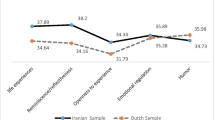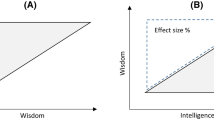Abstract
Three studies investigated the psychometric properties of the newly developed self-assessed wisdom scale (SAWS). Study 1 investigated the reliability of a 30-item questionnaire assessing 5 interrelated dimensions of wisdom. Results indicated the scale had good reliability (α = .78) and adequate factor structure. Study 2 demonstrated clear differences in people's implicit theories of wisdom using the SAWS: persons instructed to complete the measure according to their implicit theories of wisdom scored significantly higher (t = 9.40, p = .000) than persons completing the measure according to their implicit theories of foolishness. Study 3 demonstrated the construct validity of the SAWS by showing significant relationships between it and two independent measures thought to reflect aspects of wisdom, namely, generativity and ego integrity. Preliminary analyses of the SAWS suggests it has good initial reliability and validity. Suggestions for scale refinement and future research are examined.
Similar content being viewed by others
References
Ardelt, M. (1997). Wisdom and life satisfaction in old age. Journal of Gerontology: Psychological Sciences, 52B, P15-P27.
Arlin, P. K. (1990). Wisdom: The art of problem finding: In R. J. Sternberg (Ed.), Wisdom: Its nature, origins, and development (pp. 230-243). Cambridge: Cambridge University Press.
Baltes, P. B., & Smith, J. (1990). The psychology of wisdom and its ontogenesis. In R. J. Sternberg (Ed.), Wisdom: Its nature, origins, and development (pp. 87-120). New York: Cambridge University Press.
Baltes, P. B., & Staudinger, U. M. (1993). The search for a psychology of wisdom. Current Directions in Psychological Science, 2, 75-80.
Baltes, P. B., & Staudinger, U. M. (2000). Wisdom: A metaheuristic (Pragmatic) to orchestrate mind and virtue toward excellence. American Psychologist, 55, 122-136.
Birren, J. E., & Fisher, L. M. (1990). The elements of wisdom: Overview and integration. In R. J. Sternberg (Ed.), Wisdom: Its nature, origins, and development. Cambridge: Cambridge University Press.
Butler, R. N. (1995). Forward: The life review. In B. K. Haight & J. D. Webster (Eds.), The art and science of reminiscing: Theory, research, methods, and applications. Washington, DC: Taylor and Francis.
Clayton, V., & Birren, J. E. (1980). The development of wisdom across the life span: A reexamination of an ancient topic. In P. B. Baltes & O. G. Brim (Eds.), Life span development and behavior (Vol. 3). New York: Academic Press.
Csikszentmihalyi, M., & Rathunde, K. (1990). The psychology of wisdom: An evolutionary interpretation. In R. J. Sternberg (Ed.), Wisdom: Its nature, origins, and development. Cambridge: Cambridge University Press.
Denney, N. W., Dew, J. R., & Kroupa, S. L. (1995). Perceptions of wisdom: What is it and who has it? Journal of Adult Development, 2, 37-47.
Digman, J. M. (1990). Personality structure: Emergence of the five-factor model. Annual Review of Psychology, 41, 417-440.
Erikson, E. H. (1963). Childhood and Society (2nd Ed). New York: W. W. Norton.
Frecknall, P. (1994). Good humor: A qualitative study of the uses of humor in everyday life. Psychology, A Journal of Human Behavior, 31, 12-21.
Friedman, L. J. (1999). Identity's architect: A biography of Erik H. Erikson. New York: Scribner.
Gardner, H. (1983). Frames of mind: The theory of multiple intelligences. New York: Basic Books.
Holliday, S. G., & Chandler, M. J. (1986). Wisdom: Explorations in human competence. New York: Karger.
Kramer, D. A. (1990). Conceptualizing wisdom: The primacy of affect-cognition relations. In R. J. Sternberg (Ed.), Wisdom: Its nature, origins, and development. Cambridge: Cambridge University Press.
Kramer, D. A. (2000). Wisdom as a classical source of human strength: Conceptualization and empirical inquiry. Journal of Social and Clinical Psychology, 19, 83-101.
Labouvie-Vief, G. (1990). Wisdom as integrated thought: Historical and developmental perspectives. In R. J. Sternberg (Ed.), Wisdom: Its nature, origins, and development. Cambridge: Cambridge University Press.
Magai, C., & McFadden, S. H. (Eds.). (1996). Handbook of emotion, adult development, and aging. New York: Academic Press.
McAdams, D. P., & de St. Aubin, E. (1992). A theory of generativity and its assessment through self-report, behavioral acts, and narrative themes in autobiography. Journal of Personality and Social Psychology, 62, 1003-1015.
McCrae, R. R., & Costa, P. T. (1980). Openness to experience and ego level in Loevinger's Sentence Completion Test: Dispositional contributions to developmental models of personality. Journal of Personality and Social Psychology, 39, 1179-1190.
Meacham, J. A. (1990). The loss of wisdom. In R. J. Sternberg (Ed.), Wisdom: Its nature, origins, and development. Cambridge: Cambridge University Press.
Noam G. G. (1996). Reconceptualizing maturity: The search for deeper meaning. In G. G. Noam, and K. W. Fischer (Eds.), Development and vulnerability in close relationships (pp. 135-172). Mahwah, NJ: Lawrence Erlbaum.
Orwoll, L., & Perlmutter, M. (1990). The study of wise persons: Integrating a personality perspective. In R. J. Sternberg (Ed.), Wisdom: Its nature, origins, and development. Cambridge: Cambridge University Press.
Randall, W. L., & Kenyon, G. M. (2002). Reminiscence as reading our lives: Toward a wisdom environment. In J. D. Webster and B. K. Haight (Eds.), Critical advances in reminiscence work: From theory to application. (pp. 233-253). New York: Springer.
Robinson, D. N. (1990). Wisdom through the ages. In R. J. Sternberg (Ed.), Wisdom: Its nature, origins, and development. Cambridge: Cambridge University Press.
Rogers, C. R. (1961). On becoming a person: A therapist's view of psychotherapy. Boston: Houghton Mifflin.
Ryff, C. D., & Keyes, C. L. M. (1995). The structure of psychological well-being revisited. Journal of Personality and Social Psychology, 69, 719-727.
Salovey, P., & Mayer, J. D. (1990). Emotional intelligence. Imagination, Cognition, and Personality, 9, 185-211.
Simonton, D. K. (1990). Creativity and wisdom in aging. In J. E. Birren & K. W. Schaie (Eds.), Handbook of the psychology of aging (3rd ed.). New York: Academic Press.
Staudinger, U. M. (1999). Older and wiser? Integrating results on the relationship between age and wisdom-related performance. International Journal of Behavioral Development, 23, 641-664.
Staudinger, U. M., & Baltes, P. B. (1996). Interactive minds: A facilitative setting for wisdom-related performance? Journal of Personality and Social Psychology, 71, 746-762.
Staudinger, U. M., Lopez, D. F., & Baltes, P. B. (1997). The psychometric location of wisdom-related performance: Intelligence, personality, and more? Personality and Social PsychologyBulletin, 23, 1200-1214.
Sternberg, R. J. (1985). Implicit theories of intelligence, creativity, and wisdom. Journal of Personality and Social Psychology, 49, 607-627.
Sternberg, R. J. (1990a). Preface. In R. J. Sternberg (Ed.), Wisdom: Its nature, origins, and development. Cambridge: Cambridge University Press.
Sternberg, R. J. (1990b). Wisdom and its relations to intelligence and creativity. In R. J. Sternberg (Ed.), Wisdom: Its nature, origins, and development. Cambridge: Cambridge University Press.
Sternberg, R. J. (1998). A balance theory of wisdom. Review of General Psychology, 2, 347-365.
Taft, L. B., & Nehrke, M. F. (1990). Reminiscence, life review, and ego integrity in nursing home residents. International Journal of Aging and Human Development, 30, 189-196.
Takahashi, M. (2000). Toward a culturally inclusive understanding of wisdom: Historical roots in the East and West. International Journal of Aging and Human Development, 5, 217-230.
Taranto, M. A. (1989). Facets of wisdom: A theoretical synthesis. International Journal of Aging and Human Development, 29, 1-21.
Vaillant, G. (1977). Adaptation to life. Boston: Little Brown.
Webster, J. D., & McCall, M. E. (1999). Reminiscence functions across adulthood: A replication and extension. Journal of Adult Development, 6, 73-85.
Webster's New World Thesaurus (2nd Ed.) (1971). Cleveland, OH: William Collins.
Wink, P., & Helson, R. (1997). Practical and transcendent wisdom: Their nature and some longitudinal findings. Journal of Adult Development, 4, 1-15.
Author information
Authors and Affiliations
Rights and permissions
About this article
Cite this article
Webster, J.D. An Exploratory Analysis of a Self-Assessed Wisdom Scale. Journal of Adult Development 10, 13–22 (2003). https://doi.org/10.1023/A:1020782619051
Issue Date:
DOI: https://doi.org/10.1023/A:1020782619051




